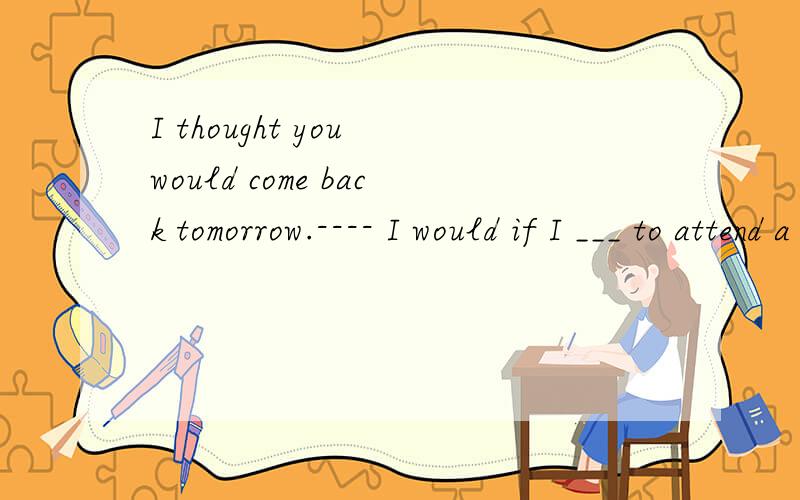I thought you would come back tomorrow.---- I would if I ___ to attend a meeting.A.don’t have B.didn’t have C.will not have D.would not have 选b ,为什么.如何理解.
来源:学生作业帮助网 编辑:作业帮 时间:2024/04/28 09:16:48

I thought you would come back tomorrow.---- I would if I ___ to attend a meeting.A.don’t have B.didn’t have C.will not have D.would not have 选b ,为什么.如何理解.
I thought you would come back tomorrow.
---- I would if I ___ to attend a meeting.
A.don’t have B.didn’t have C.will not have D.would not have
选b ,为什么.如何理解.
I thought you would come back tomorrow.---- I would if I ___ to attend a meeting.A.don’t have B.didn’t have C.will not have D.would not have 选b ,为什么.如何理解.
虚拟语气,对将来事情的假设,主句用would/should/might/could等情态动词,if引导的从句用一般过去式.你看情景对话前一句:用的是i thought我原以为你明天会回来.
答:如果明天不开会我就回来.很明显意思就是回不来.
虚拟语气,表示推测已经不可能的事情
其格式,条件句向前一个时态,主句用would
如果我不参加会议,我就回来了。(但是因为参加会,回不来)
B 虚拟语气 与现在事实相反固定结构
专业团队献上最专业的解答 请考虑采纳谢谢
虚拟语气 , 时态向过去推一格
这是一个虚拟语气的句子,“如果我不是必须参加一个会,我明天会回来”。
虚拟语句!这考的是对虚拟语句的理解!I would if 句式+虚拟。
在这里是if引导的虚拟语气
虚拟语气在条件句中的用法
If引导出的条件句中使用虚拟语气时,表示所说的话是非真实的,是一种假设。通常有三种情况,与现在事实相反;与过去的事实相反;与将来的事实相反。
1、if从句表示与想在的事实相反的假设时,从句的谓语动词用一般过去时(be一般用were),主句用would/should/could/might+动词原形
If we h...
全部展开
在这里是if引导的虚拟语气
虚拟语气在条件句中的用法
If引导出的条件句中使用虚拟语气时,表示所说的话是非真实的,是一种假设。通常有三种情况,与现在事实相反;与过去的事实相反;与将来的事实相反。
1、if从句表示与想在的事实相反的假设时,从句的谓语动词用一般过去时(be一般用were),主句用would/should/could/might+动词原形
If we had enough money, we would buy a computer
If I were you,I would take her advice.
If places were a like,there would be little need for geographers.如果各个地方都一样,就不需要地理学家了。
Our life would be better if there were no examination.
2、从句表示与过去事实相反的假设时,从句的谓语动词用过去完成时,主语用would/should/could/might+have+过去分词
If I had worked harder at school,I would have got a better job.
If he had know your address yesterday,he would have telephoned you.
We might have arrived here eariler if we had taken a taxi.
If it had not been for you help, I would have failed again.
3、从句表示与将来事实可能相反的假设时,从句的谓语动词用一般过去时,were to do或should+动词原形,主句用[/B]would/should/could/might+动词原形
If it rained tomorrow,we would put off the sports meet.
If he were to leave today,he would get there by Friday.
If she should fail again,we would not blame her.
【注】
(1)有时从句假设过去,而主句假设现在,这时从句用过去完成时,而主句用would/should/could/might+动词原形。
If he had taken my advice,he would be much better now.
(2)if从句中如果有助动词had,should或were时,可以省略if,而从句使用倒装语序。
Had you not left so early,you might have missed the train.
Were I to be young again,I would study medicine.
Should we miss the train,we should have to wait an hour at the station.
(3)有时候假设的情况不是以条件句的形式表示出来,而是用介词without,but for等或是用连词but,or,otherwise等方式来表示的。
Without you help,I wouldn’t have achieved so much,.
But for your help,I would not have succeeded.
We didn’t know his telephone number,otherwise we would have telephone him.
收起